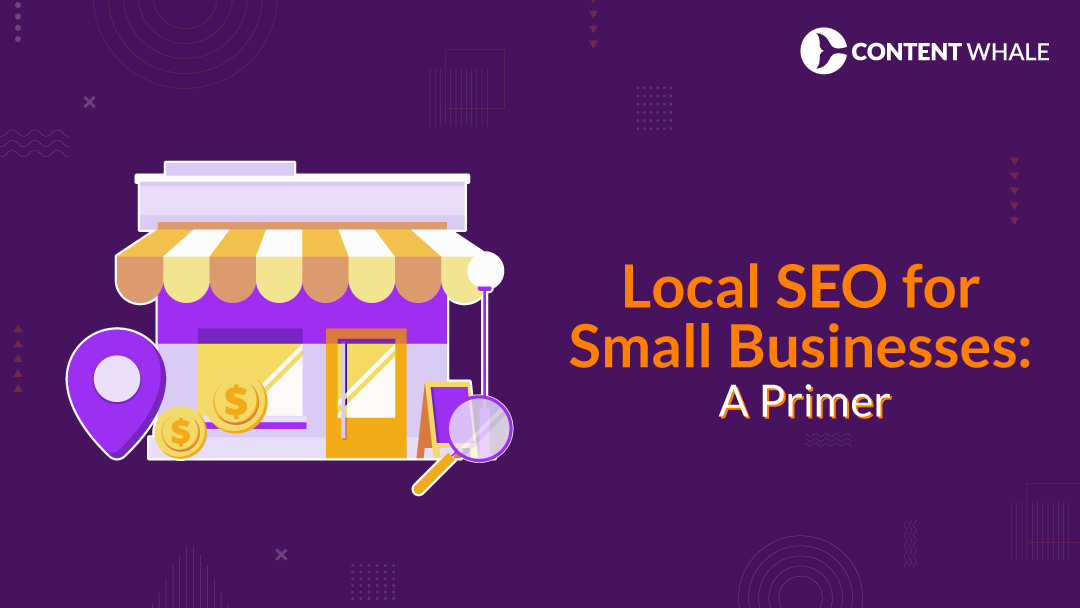Local SEO for small businesses is essential to enhance visibility in local searches. This visibility drives more local traffic and increases customer engagement. SEO for local businesses helps them compete in their specific markets by targeting local customers who are more likely to convert.
Local searches, often including phrases like “near me” or specific locations, connect businesses with customers in their vicinity. This connection is vital for small businesses looking to grow and expand their customer base. Local small business SEO focuses on optimizing online presence to ensure businesses appear in relevant local searches, leading to increased foot traffic and online engagement.
This blog will cover the importance of local SEO for SMBs, its impact on small business growth, and key strategies to implement. We’ll delve into Google My Business optimization, local keyword research, and effective online reviews. Additionally, we’ll discuss on-page and off-page SEO tactics and how to measure the success of these efforts.
By implementing local SEO strategies for small businesses, they can benefit from increased traffic, improved local presence, and higher conversion rates. Let’s explore how local SEO for small businesses can be a game-changer in achieving business growth and visibility.
Understanding Local SEO
Local SEO for small businesses focuses on optimizing a business’s online presence to attract local customers. Unlike general SEO, which targets broad search terms, SEO for local businesses aims to rank for searches that include location-specific keywords.
Local SEO is vital for small businesses because it connects them with customers in their area who are ready to make a purchase. This is particularly important for physical stores or service-based businesses that rely on foot traffic or local clientele. Local small business SEO ensures that your business appears in local search results, maps, and local packs, increasing visibility and attracting more targeted traffic.
The difference between local SEO and general SEO lies in the focus on geographic relevance. While general SEO aims for global or national visibility, local SEO for SMB targets searches with local intent, such as “plumber near me” or “best coffee shop in [city].” This specificity helps small businesses compete effectively in their local market.
Implementing local SEO strategies for small businesses can lead to significant benefits, including increased web traffic, higher conversion rates, and improved local presence. By focusing on local search optimization, businesses can connect with nearby customers, build stronger community ties, and ultimately drive more sales.
Key Components of Local SEO
1. Google My Business Optimization
Optimize your Google My Business profile by ensuring all information is accurate and complete. This includes your business name, address, phone number (NAP), and hours of operation. Regularly update your profile with new photos, posts, and special offers. Engaging with customer reviews on Google My Business boosts credibility and can improve local search rankings.
2. Local Keyword Research
Conducting thorough local keyword research is essential for small business local SEO. Use tools like Google Keyword Planner to identify keywords your target audience uses. Focus on phrases that include your location, such as “best bakery in [city]” or “top plumber near me.” Incorporating these keywords into your website content helps attract local traffic.
3. NAP Consistency
Ensure your business’s name, address, and phone number are consistent across all online platforms. Inconsistent NAP information can confuse search engines and potential customers. This consistency is vital for SEO for local businesses as it builds trust and improves search engine rankings.
4. Online Reviews and Ratings
Positive reviews and high ratings are significant factors in local small business SEO. Encourage satisfied customers to leave reviews on Google, Yelp, and other review sites. Responding to reviews, whether positive or negative, shows engagement and helps build a positive online reputation. Reviews act as social proof, influencing potential customers’ decisions.
Implementing these local SEO strategies for small businesses can significantly improve your visibility in local search results. By focusing on optimizing your Google My Business profile, conducting local keyword research, maintaining NAP consistency, and managing online reviews, you can attract more local customers and enhance your business’s online presence.
On-Page SEO for Local Search
Optimizing Website Content: Use local keywords naturally in your website content, headers, and meta descriptions. This practice is essential for local SEO for small businesses. Create blog posts and service pages that address local events, news, or community interests to attract local traffic.
1. Creating Locally-Focused Landing Pages
If your business has multiple locations, create separate landing pages for each one. Each page should include specific information such as the address, hours of operation, and unique selling points. This enhances SEO for local businesses by targeting location-specific searches. Ensure that each location page is optimized with local keywords and provides valuable information tailored to that location.
2. Importance of Meta Tags and Descriptions
Optimizing your meta tags and descriptions with local keywords improves visibility in search results. Your meta descriptions should be concise, compelling, and include a call to action. This approach supports local small business SEO by increasing the likelihood that users will click on your link in search results. For example, include your city or neighborhood name in title tags and meta descriptions to target local search queries effectively.
3. Structured Data and Local Business Schema
Implement structured data markup (schema) to provide search engines with detailed information about your business. This can enhance your appearance in search results with rich snippets, including business hours, reviews, and more. Structured data helps search engines understand the content of your site better, which is crucial for local SEO strategies for small businesses. Adding structured data for your business type and location can significantly boost your local search rankings
Local SEO for SMBs can improve significantly by focusing on these on-page SEO tactics. Optimizing your website content, creating locally focused landing pages, using effective meta tags and descriptions, and implementing structured data are all essential steps. These strategies help improve your visibility in local searches, attract more local customers, and boost your online presence.
Off-Page SEO Strategies
1. Building Local Backlinks
Acquire backlinks from local websites, such as news sites, blogs, and business directories. These links signal to search engines that your site is relevant and trusted within your local area. This strategy is vital for local SEO for small businesses as it helps improve your search rankings.
2. Engaging with Local Communities on Social Media
Use social media platforms to interact with your local community. Share local news, events, and promotions. Engaging content encourages shares and interactions, which can drive traffic to your website. This boosts SEO for local businesses by increasing your online presence.
3. Citations and Local Directory Listings
Ensure your business is listed accurately in relevant local directories. Citations from authoritative local sites can enhance your local small business SEO. Consistent NAP information across directories builds trust with search engines and potential customers.
Implementing these local SEO strategies for small businesses can significantly enhance your local search rankings. By focusing on building local backlinks, engaging with local communities on social media, and maintaining accurate local directory listings, you can attract more local customers and improve your online visibility. These off-page SEO strategies are essential for local SEO for SMBs and help small businesses compete effectively in their local markets.
Measuring Local SEO Success
1. Tools to Track Local SEO Performance
Monitor your website’s performance using tools like Google Analytics and Google Search Console. These tools help track metrics essential for local SEO for small businesses, such as local search rankings, website traffic, and conversion rates.
Key Metrics to Monitor
2. Focus on local search rankings to see how well your business is performing in local searches. Monitor website traffic to understand the effectiveness of your SEO for local businesses. Track conversion rates to measure how many visitors turn into customers, providing a clear picture of your local small business SEO efforts.
3. Adjusting Strategies Based on Performance Data
Review your performance data regularly to identify areas for improvement. Adjust your local SEO strategy for small businesses based on what is working and what needs enhancement. This will ensure that your business continues to grow and improve its online presence.
Measuring the success of local SEO for SMBs involves tracking key metrics and using reliable tools. By focusing on these metrics and making data-driven adjustments, small businesses can optimize their local SEO efforts and achieve better results. This approach helps maintain and improve search rankings, attracting more local customers and enhancing overall business performance.
Local SEO is essential for small businesses to increase visibility and attract local customers. By implementing effective SEO strategies, small businesses can see significant growth in their online presence. Key steps include focusing on Google My Business optimization, local keyword research, consistent NAP information, and managing online reviews.
The benefits of local small business SEO include increased website traffic, higher conversion rates, and a stronger local presence. Stay updated with local SEO strategies for small businesses and continuously optimize your efforts to maintain and improve your rankings. Start enhancing your local SEO for SMBs today to achieve better visibility and growth.
Implementing these strategies can transform your business. The right approach to local SEO for small businesses can help attract more local customers. Take action now and watch your business thrive with improved local SEO tactics.
What is local SEO, and why is it important for small businesses?
Local SEO optimizes small businesses’ online presence to attract local customers. It’s crucial for increasing visibility in local searches, driving traffic, and boosting sales. Effective SEO helps small enterprises compete with larger companies by focusing on local markets.
How can I improve my local search rankings?
Optimizing your Google My Business profile, conducting local keyword research, and ensuring NAP consistency can improve your local search rankings. You should also encourage positive online reviews and build local backlinks, which are essential for effective local small business SEO.
What are the best tools for tracking local SEO performance?
Google Analytics and Google Search Console are top tools for tracking local SEO for SMBs. They help monitor website traffic, local search rankings, and conversion rates. Using these tools, you can refine your local SEO strategies for small businesses.
How often should I update my local SEO strategies?
Review and update your local SEO small business strategies regularly based on performance data and changing trends. Frequent updates ensure continued visibility and growth. Adjusting your tactics helps maintain and improve your local search rankings.
Can local SEO help me compete with larger businesses?
Yes, local SEO for small businesses can level the playing field. By focusing on local search optimization, small businesses can compete effectively with larger companies. Implementing strong SEO for local business strategies attracts local customers and enhances visibility.
These FAQs address common questions about local SEO for small businesses. Implementing the discussed strategies can significantly improve your local search performance and help you compete effectively in your market.





